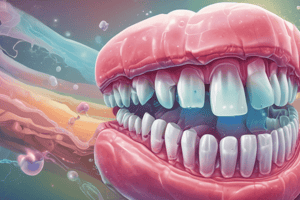Podcast
Questions and Answers
The teeth of those ancient humans were riddled with ______.
The teeth of those ancient humans were riddled with ______.
holes
We typically pick up ______ as babies from our mother's mouths.
We typically pick up ______ as babies from our mother's mouths.
microbes
Diets high in sugary foods cause an explosion of ______ in our mouths.
Diets high in sugary foods cause an explosion of ______ in our mouths.
bacteria
The acid generated by bacteria degrades the ______ over time.
The acid generated by bacteria degrades the ______ over time.
The bacterial invasion progresses, causing excruciating pain as the ______ become exposed.
The bacterial invasion progresses, causing excruciating pain as the ______ become exposed.
Cavemen would have consumed ______ vegetables, nuts, and grains.
Cavemen would have consumed ______ vegetables, nuts, and grains.
When exposed to ______ in the saliva, carbohydrates get broken down into simpler sugars.
When exposed to ______ in the saliva, carbohydrates get broken down into simpler sugars.
Ancient humans even made rudimentary drills to smooth out the rough ______ left behind.
Ancient humans even made rudimentary drills to smooth out the rough ______ left behind.
Today, an incredible 92% of American adults have had ______ in their teeth.
Today, an incredible 92% of American adults have had ______ in their teeth.
In most toothpastes and many water supplies, we use tiny amounts of ______ to strengthen teeth.
In most toothpastes and many water supplies, we use tiny amounts of ______ to strengthen teeth.
Flashcards are hidden until you start studying
Study Notes
Cavities and Sugar Consumption
- 15,000-year-old human remains were found with teeth riddled with cavities caused by tiny microbes that live in our mouths
- These microbes, specifically mutans streptococci, are attracted to sugar and use it as a molecular building block and energy source
- Diets high in sugary foods cause an explosion of mutans streptococci in our mouths, leading to acid production and tooth decay
- Acid degrades the enamel on our teeth, causing cavities to form
- If left untreated, cavities can progress beyond the dentin, causing excruciating pain and potentially leading to tooth loss
Ancient Humans and Cavities
- Despite having a low-sugar diet, ancient humans still consumed carbohydrates from root vegetables, nuts, and grains that could break down into sugars
- This would have exposed their teeth to sugars, increasing the risk of cavities
- Archaeological evidence shows that ancient humans used sharpened flint to remove rotten teeth and even made rudimentary drills and beeswax fillings to treat cavities
Modern Cavities and Prevention
- The human incidence of cavities surged after the Industrial Revolution due to increased access to refined sugar
- Today, 92% of American adults have had cavities in their teeth
- High sugar consumption is a major contributor to cavities, but some people are more susceptible due to genetic factors
- Fluoride in toothpaste and water supplies can help strengthen teeth and prevent cavities
- Good oral hygiene practices, such as regular tooth brushing and flossing, can help prevent cavities
- Avoiding sugary, starchy, and sticky foods can also reduce the risk of cavities
Studying That Suits You
Use AI to generate personalized quizzes and flashcards to suit your learning preferences.




